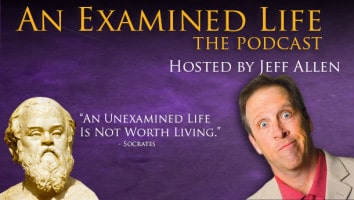Podcast: Play in new window | Download
Subscribe: RSS

Nancy Pearcey, author of books such as How Now Shall We Live and Total Truth and visiting scholar at Houston Baptist University, joins us on today’s show.
Jeff Allen: You have stated before that you were a skeptic and at one point slipped into a period of nihilism. Could you explain this period?
Nancy Pearcey: When I was 19, I went to L’Abri and they knew the questions I had better than I did. As Christians, they had studied worldviews enough that they understood secular thought better than I did. So, for example, I would say, “You can’t say anything is right or wrong,” and they would inform that what I said was relativism, which I was completely unaware of at the time. Then, they’d take me back to where relativism came from and analyze the intellectual history that led up to it to give me a chance to think more critically about whether or not I wanted to really be a relativist. This is where Christians need to go. It’s like a sports team; not only do we need to know our own strategy, we need to know the strategy of the other side. If we know the other team’s strategy better than they know it, we will be prepared to counter it. That is the kind of education I got at L’Abri.
At that time, because I had been a Christian, I knew that if there was no God there was no basis for morality. It was obvious to me that I needed to be relativist. As a skeptic, I thought that if it was just my puny brain within the vast reaches of time and space, then how could I be able to know some eternal objective truth. I even got into solipsism at one point, which is the thinking that all you can know is basically the inside of your own head. I was in High School and I dooodled cartoons of the whole world as just a thought bubble inside my head. That’s nihilism. Nihilism is when you get to the point you don’t think anything is real. Moral nihilism is when you think that there is no right or wrong, no good or evil. Metaphysical nihilism is when you believe that you can’t know any truth.
I had definitely reached nihilism and there was no lower to go from there. I was obviously getting more and more depressed since I had no answers and thought there were none. This was an unpleasant, dark, and difficult time for me. I wouldn’t have lasted a whole lot longer if I hadn’t ran into questions that knew how to address such questions.
Jeff: What were your parents going through as you were going through this?
Nancy: My parents were clueless, which was part of the problem. People will say to me, “Wasn’t there anyone to speak into your life?” I always respond with “No, I was reaching out and asking questions and I couldn’t find any Christians that could answer my questions.” The main response when I asked these questions was, “What’s wrong with you? Why don’t you have more faith?” They treated my lack of faith as a moral failing and thought I had a problem. Therefore, I did not get people who treated intellectual questions seriously, and you can still see it today. Most youth groups act as though they just need to give children an intense emotional experience and a sense of belonging that will override their intellectual doubt. The statistics of those who drop away from of the faith when they leave high school to go to high are way too high. Obviously, it’s not working. We need to treat people with respect. Yes, we have a heart. Yes, we need to be treated well, emotionally, but we also have a mind. We need to respect that, the questions that young people have, and do the hard work to find the answers. A lot of times, we are scared that there are no answers or we just don’t want to do the hard work. It’s a sacrificial ministry to listen to people’s questions and go out to do the hard work. Apologetics is ultimately love and we have to love people enough to spend that kind of time and effort finding answers for them.
People think apologetics is some sort of nerdy, intellectual thing, but it’s not. It should be driven by love. I got a call from one of my fellow professors at HBU not long ago and he said, “Some of our kids are losing their faith. We know that you went through that. Will you come talk to them?” It’s happening everywhere. We are facing a more secularized society than ever before and they need to have answers.
Jeff: You’re book, Finding Truth: Five Principles, was written for the Church for this specific reason. Could you explain what these principles are?
Nancy: It is often said that apologetics truth don’t have enough scripture, and there is some truth to that. They are full of good, logical arguments, but they don’t have a lot of scripture. In Finding Truth, I show that all of the major arguments are actually rooted in scripture. Nobody has made the connection before, but they all are rooted in Romans 1. It was amazing to me Romans 1’s gift of basis to common reasoning and not just in the field of apologetics.
You test an idea two ways: does your theory fit the real world and does it hold together logically? All arguments are examples of one of those two questions and Romans 1 gives a basis to both of these categories of arguments. Romans1 is where Paul makes the case for God from the created order. He says that all people have evidence for God from the created order. Most people think that means nature and the beauty and complexity of nature, and it does. I have a section on that in Total Truth, but in this book, I focus on humanity. Humans are part of the created order, too, and we give evidence for God. So, Finding Truth, focuses on the views of the human person and how we can test worldviews for how they account for who we are as people. The underlying example of all this is the cause it to be to the effect. Because human beings are capable of thinking, the first cause that created them must have a mind. Because human beings are capable of choosing, the first cause that created them must have a will. One philosopher summarized this by saying “Because a human is a someone and not a something, the first cause that created us must be a someone and not a the blind, automatic forces of nature, as materialism and naturalism would have us believe.” As an Old Testament psalm puts it, “Does He who created the ear not hear? Does He who created the eye not see?” So all of them are predicated are the notion that we can know the kind of God that must logically be there, if that kind of God can account for humanity, who we are.
The second part of Paul’s argument is that if you don’t acknowledge the transcendent, personal creator, you’re going to make something else into your idol. You’re going to worship something in the created order. That doesn’t just mean something concrete, like a golden calf. It can also mean something abstract, like the concept of matter. Is matter part of the created order? Sure it is. So materialism qualifies as an idol in the biblical sense, because it replaces God as the ultimate reality and the eternal cause of everything else.
You can also think of reason. Can reason be an idol? Of course it can. Rationalism is philosophy that puts reason in the place of God as the source and standard of all truth. In fact, Albert Einstein called himself a believing rationalist. He understood it as full-blown worldview.
Now, the first principle is to identify the idol. I tell my students that they are all encountering the world of ideas for the first and are overwhelmed by the number of –isms that are out there. You need to just cut to the heart and find its idol. What does it propose is the ultimate, eternal, self-existing cause of everything else? Everything else will flow from there. For example, take materialism. Once you make matter your idol, you must reduce humans to complex biochemical machines. No soul, no spirit , no free will, no mind or consciousness. That’s what materialists are saying today. Our leading scientists and philosophers are saying that there’s not even free will, since that goes beyond matter. They have to have a very low, inhumane view of the human person because of their idol. That’s where you test it. Do people actually behave like complex biochemical machines? Of course not.
The second principle is to identify the resulting low view of the human person, also known as reductionism. If you have an idol, you will recast human in the image of that idol. Since, the idol is always less than the biblical God, you will always end up with a lower, less humane view of the human person.
The next principle is to test it against reality. In my book Finding Truth, I found some amazing examples of leading thinkers who acknowledge that their worldview isn’t the real worldview. For example, Rodney Brooks, head of the artificial intelligence lab at MIT wrote a book where he claimed that, by the laws of physics and chemistry, human beings are just a big bag of skin full of biomolecules. Then he says, “I know that it is hard to see people this way in real life, but if I force myself I can see that my children are machines. Do I treat them that way? Of course not. They have my unconditional life.” There, he admits that love has no rational analysis within his materialistic worldview. The last line of that paragraph says, “I maintain two sets of inconsistent belief.” He has two worldviews causing tension within himself. Romans 1 says that God gives us up to follow these idols, so that we don’t experience the tension caused by our contradictory beliefs. He’s aware of the evidence that we are made in the image of a personal God, but he’s holding to his professional worldview that humans are just machines. He’s going through cognitive dissonance, the state of having two contradictory beliefs. Why does God give people up to follow their idols? He increases the tension until they have to make a decision. So, a man like Rodney Brooks has to either recognize that we are personal being made by a personal God or cling to his beliefs, despite all of the evidence. These modern worldviews really illustrate these worldviews dramatically.
If you want to learn more about Nancy Pearcey, go to the pearceyreport.com, which covers cultural issues from a biblical perspective.